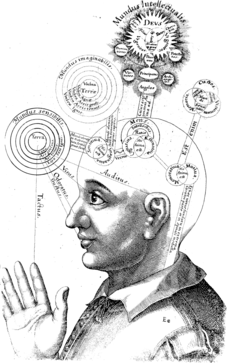Metacognition is an awareness of one's thought processes and an understanding of the patterns behind them. The term comes from the root word meta, meaning...
79 KB (10,084 words) - 03:54, 26 May 2025
Cognition (section Metacognition)
components of metacognition: (1) cognitive conceptions and (2) cognitive regulation system. Research has shown that both components of metacognition play key...
51 KB (5,977 words) - 08:10, 31 May 2025
The metacognitions questionnaire is a self-report scale assessing different dimensions of metacognitive beliefs (beliefs about thinking). Examples of metacognitive...
4 KB (529 words) - 15:48, 28 February 2025
ISBN 978-0-313-35759-6. Klempe, Sven Hroar (2022). Sound and Reason: Synesthesia as Metacognition. Palgrave Studies in Sound. Singapore: Springer Nature. p. 83. ISBN 978-981-19-2340-1...
468 KB (35,622 words) - 14:04, 28 May 2025
Cognitive psychology (section Metacognition)
assessments. Metacognition, in a broad sense, is the thoughts that a person has about their own thoughts. More specifically, metacognition includes things...
46 KB (5,560 words) - 01:18, 31 May 2025
Organizational metacognition is knowing what an organization knows, a concept related to metacognition, organizational learning, the learning organization...
9 KB (935 words) - 20:47, 25 August 2023
Meta-learning is a branch of metacognition concerned with learning about one's own learning and learning processes. The term comes from the meta prefix's...
7 KB (799 words) - 05:12, 12 January 2025
Animal consciousness (section Metacognition)
suggested that metacognition in some animals provides evidence for cognitive self-awareness. There are generally two components of metacognition: knowledge...
126 KB (14,125 words) - 17:16, 30 May 2025
Adolescence (section Metacognition)
use mnemonic devices and other strategies to think more efficiently. Metacognition: Improved knowledge of their own thinking patterns increase self-control...
178 KB (21,999 words) - 14:48, 17 May 2025
(2006) attribute this response to metacognition. They believe that "a learning goal facilitates or enhances metacognition—namely, planning, monitoring, and...
90 KB (11,231 words) - 13:43, 22 May 2025
Professor, Emeritus at Stanford University. A foundational researcher of metacognition and metamemory, he was a member of both the National Academy of Sciences...
11 KB (982 words) - 00:02, 30 May 2025
feeling, or perception. It may be awareness, awareness of awareness, metacognition, or self-awareness, either continuously changing or not. The disparate...
170 KB (19,944 words) - 04:12, 28 May 2025
psychological factors thought to maintain all psychological disorders). Metacognition, Greek for "after" (meta) "thought" (cognition), refers to the human...
16 KB (1,822 words) - 09:49, 25 March 2025
sophisticated processes such as decision making, problem solving and metacognition. Cognitive science has provided theories of how the brain works, and...
6 KB (710 words) - 20:41, 27 May 2025
the tendency to overestimate one's ability and see the relation to metacognition as a possible explanation that is not part of the definition. This contrast...
46 KB (5,167 words) - 21:21, 22 May 2025
Pattern recognition Attention Memory Aging Emotional Learning Long-term Metacognition Language Metalanguage Thinking Cognition Concept Reasoning Decision...
14 KB (1,849 words) - 05:25, 13 May 2024
Toronto. Her research focuses on epistemology, philosophy of mind, and metacognition. She has also written on 17th century (Western) philosophy, especially...
10 KB (1,075 words) - 18:43, 24 May 2025
meta-cognitive strategies can be taught to a child over time. Studies within metacognition have proven the value in active learning, claiming that the learning...
79 KB (9,970 words) - 14:03, 23 May 2025
assessment and instruction. ERIC Document No. ED 315–423 "Teaching Metacognition". Metacognition. Retrieved 3 April 2018. Facione, Peter A.; Sánchez, Carol A...
56 KB (6,790 words) - 23:39, 29 May 2025
Insight (section Metacognition)
not experienced insight. People are poorer at predicting their own metacognition for insight problems, than for non-insight problems. People were asked...
34 KB (3,892 words) - 01:08, 25 May 2025
Self-reflection depends upon a range of functions, including introspection and metacognition, which develop from infancy through adolescence, affecting how individuals...
19 KB (2,170 words) - 13:21, 27 May 2025
Soft skills (section Metacognition)
emphasized the importance of metacognitive skills for lifelong learning. Metacognition amounts to thinking about one's thinking. More specifically, it refers...
32 KB (3,890 words) - 18:09, 24 May 2025
Goal orientation (section Metacognition)
studies conducted on the role of metacognition in leader development outcomes, some studies have found that metacognition plays an important role in such...
71 KB (8,386 words) - 15:17, 30 March 2025
Infant cognitive development (section Metacognition)
Infant cognitive development is the first stage of human cognitive development, in the youngest children. The academic field of infant cognitive development...
57 KB (6,595 words) - 13:47, 22 May 2025
features as self-reflective awareness, abstract thinking, volition and metacognition. The term was coined by Gerald Edelman. Since Descartes's proposal of...
25 KB (3,492 words) - 11:21, 19 March 2025
responses that assist in the maintenance of anorexia. In addition to metacognition, people with anorexia also have difficulty with social cognition including...
168 KB (19,299 words) - 18:39, 22 May 2025
Herbert S. Terrace (section Metacognition)
about its own behavior, that is, its ability to engage in metacognition. In humans, metacognition is assessed by asking subjects how certain they are about...
19 KB (2,292 words) - 10:56, 21 May 2025
Pattern recognition Attention Memory Aging Emotional Learning Long-term Metacognition Language Metalanguage Thinking Cognition Concept Reasoning Decision...
18 KB (2,255 words) - 15:46, 16 May 2025
Abigail (2022-05-04). "Unusual experiences and their association with metacognition: investigating ASMR and Tulpamancy". Cognitive Neuropsychiatry. 27 (2–3):...
15 KB (1,545 words) - 12:41, 31 May 2025
Neuropsychology of writing (section Metacognition)
more aware of their writing- this concept is called metacognition.[citation needed] Metacognition is the idea of thinking about one's own thinking. It...
20 KB (2,619 words) - 13:33, 24 May 2025










